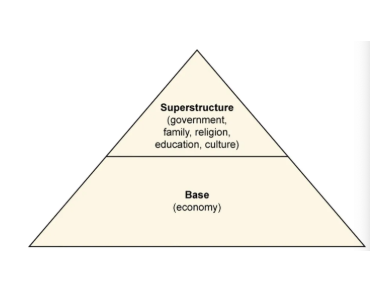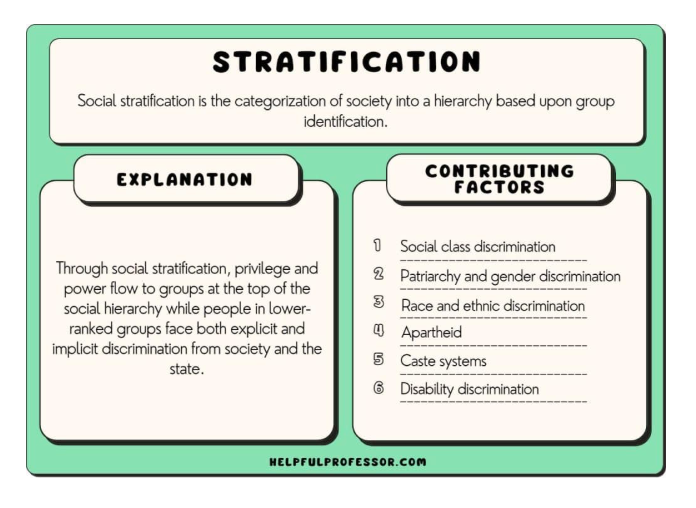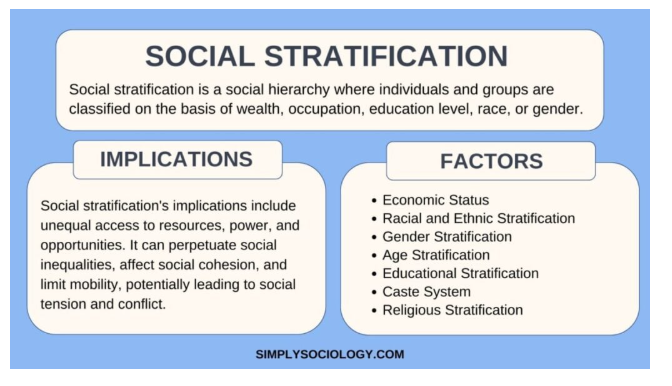Is Social Class just an Abstract Concept?
1/29
Earn XP
Description and Tags
Week 3
Name | Mastery | Learn | Test | Matching | Spaced | Call with Kai |
|---|
No analytics yet
Send a link to your students to track their progress
30 Terms
What is the Davis-Moore thesis and what does it propose?
→ it’s a structural functionalist theory explaining social stratification by arguing that inequality is a necessary and beneficial component of any society
→ this is because social stratification (like a social hierarchies of jobs based on skill that deem some jobs more valuable than others) motivate individuals to perform important roles by offering greater rewards (ex. lawyer or doctor)
How do conflict theorists critique social stratification?
→ social stratification doesn’t benefit everyone as some valuable jobs such as teaching are underpaid while some basketball players are millionaires; demonstrating how social stratification perpetuates inequality
→ draw on the work of Karl Marx; social stratification is a mobilizer for capitalism meant to make business owners rich and keep workers poor; and this results in class conflict
How do social interactionists view social stratification?
→ social stratification is what encourages individuals to connect with people who are like them because the people that tend to live and work together often share the same income level, educational background, class traits and even tastes in food, music, and clothing
How do people communicate their social status?
→ through conspicuous consumption: the purchase and use of certain products to make a social statement about status (like a sports car, shoes, etc.)
How would Durkheim view social interaction?
→ as Durkheim contributed to the development of functionalism, he stressed that there is an interconnectivity or intersectionality between individual and collective behaviour as he believed that society works like the human body where institutions function together as organs do to keep the entire system healthy and stable
What is the collective conscience?
→ proposed by Durkheim, it is the communal beliefs, morals, and attitudes of a society which causes individuals to act in similar and predictable ways to conform to customs so as to prevent ridicule and social isolation (which can feel almost like a sort of punishment)
What is social integration?
→ what Durkheim claimed to be the strength of ties that people have to their social groups = a key factor in social life
What did Durkheim believe about deviance?
→ Even the socially deviant members of society are necessary, Durkheim argued, as punishments for deviance affirm established cultural values and norms. That is, punishment of a crime reaffirms our moral consciousness. “A crime is a crime because we condemn it,”
→ Durkheim called these elements of society “social facts.” By this, he meant that social forces were to be considered real and existed outside the individual.
What is mechanical vs. organic solidarity?
→ Preindustrial societies, Durkheim explained, were held together by mechanical solidarity, a type of social order maintained by the collective conscience of a culture
→ Societies with mechanical solidarity act in a mechanical fashion; things are done mostly because they have always been done that way. This type of thinking was common in preindustrial societies where strong bonds of kinship and a low division of labor created shared morals and values among people, such as hunter-gatherer groups
→ When people tend to do the same type of work, Durkheim argued, they tend to think and act alike
vs.
→ In capitalist societies, Durkheim wrote, division of labor becomes so specialized that everyone is doing different things. Instead of punishing members of a society for failure to assimilate to common values, organic solidarity allows people with differing values to coexist
→ organic solidarity can lead to anomie; a state of "normlessness" where social rules and moral standards lose their power to regulate individual behavior; lose collective conscience
How did Karl Marx view society’s structure to be like?
→ Karl Marx asserted that all elements of a society’s structure depend on its economic structure as the base
→ Economically, he saw conflict existing between the owners of the means of production—the bourgeoisie—and the laborers, called the proletariat

How does Karl Marx describe modern society?
→ Marx described modern society in terms of alienation. Alienation refers to the condition in which the individual is isolated and divorced from his or her society, work, or the sense of self. Marx defined four specific types of alienation
What did Marx state about consciousness?
→ proposed the idea that society is in a state of false consciousness: which is the failure to recognize these shared interests and the exploitative nature of the system, instead adopting individualistic beliefs or the ideology of the dominant class that work against one's own true class interests
→ and that rather society should replace this with class consciousness: the awareness of one's economic and social class and the shared interests that come with it, often leading to collective action to challenge the ruling class
]
How would Karl Marx view social class?
→ class is economically determined
→ social class is not an abstract concept as it is very integrated into people lives
→ as he had a critical analysis of capitalism, he takes on a historical perspective of how class struggle has remained central to history
How did Max Weber use symbolic interactionism to describe society and class?
→ symbolic interactionism emphasizes the viewpoint of the individual and how that individual relates to society
→ the culmination of industrialization & rationalization results in the iron cage, in which the individual is trapped by institutions and bureaucracy; → this leads to a sense of “disenchantment of the world,” a phrase Weber used to describe the final condition of humanity
What did Max Weber believe about class in comparison to Durkheim and Marx?
→ like Marx and Durkheim, Weber feared that industrialization would have negative effects on individuals
→ Similar to Marx, Weber saw class as economically determined & society was split between owners & laborers
→ Status, on the other hand, was based on noneconomic factors such as education, kinship, and religion. Both status and class determined an individual’s power, or influence over ideas, but unlike Marx, Weber believed that these ideas formed the base of society
What was Weber’s concept of rationalization?
→ A rational society is one built around logic and efficiency rather than morality or tradition. To Weber, capitalism is entirely rational. Although this leads to efficiency and merit-based success, it can have negative effects when taken to the extreme (rigid routines, mechanized work environment)
How would DuBois view social class?
→ You can’t look at how social class is established without looking at how race is also influential
How would Margaret Thatcher view social class?
Margaret Thatcher, class is an abstract concept due to merit, you just have to work hard, that is the source of social mobility
How does Bourdieu view social class?
Class is relational, a more abstract concept, class is determined by an individual’s possession of capital
How is Bourdieu’s theory of capital relevant to society today?
Economic capital; inherited wealth determines the type of house of you buy
Social capital; networks, the connections you make help you get a position at a competitive job
Cultural capital; knowledge of the dominant culture, fashion and how it pertains to that certain group
Symbolic; university degree, reputation, qualification
What are focus groups?
• Small group discussions (6-12 participants) guided by a researcher/moderator
• Participants discuss a specific topic, product, or social issue
• Interactive format allows participants to build on each other's responses
Why are focus groups used in sociology?
• Explore how people make sense of social issues in group settings
• Understand group dynamics and social influences on opinions
• Generate rich, detailed responses about experiences and attitudes
• Useful for exploring sensitive topics through peer discussion
• Helpful to develop research hypotheses by getting to know which demographic or participant sample you want to choose
What are five advantages of focus groups?
Rich data: Participants spark ideas in each other, leading to deeper insights
Natural interaction: More like real-world conversations than interviews
Group dynamics: Can observe how opinions form and change socially
Efficient: Gather multiple perspectives simultaneously
Flexible: Can adapt questions based on group responses
What are six disadvantages to focus groups?
• Dominant voices: Some participants may overshadow quieter members
• Social desirability bias: People may give "acceptable" answers in group settings
• Groupthink: Risk of false consensus or pressure to conform
• Difficult to analyze: Complex interactions harder to code than individual interviews
• Moderator skill required: Needs experienced facilitation
• Not generalizable: Small, non-representative samples
What is social stratification and how are privilege and power distributed?

What are the implications of stratification?

What does Max Weber say about the distribution of power within the political community (class, status, party)?
→ “every legal order directly influences the distribution of power”
What is Max Weber’s theory on social stratification?
→ society is stratified by three interconnected dimensions: class (economic position based on market situation, wealth, and skills), status (social honor, prestige, and lifestyle), and party (political power and the ability to influence collective action). Unlike Karl Marx's focus on economic ownership, Weber's multidimensional approach highlights how wealth, prestige, and power interact to determine an individual's position and life chances within the social hierarchy
What did Bourdieu say about social class?
→ “the existence of classes by the empirical measurement…is impossible to find in the real world”
→ it’s like trying to “draw a line between the rich and poor” or “the young and old”
→ proposes a “theoretical class” which he calls “a class on paper”
What are three main conclusions Bourdieu theorized about social class?
→ social class is determined by an individual's total volume and composition of different forms of capital, particularly economic, cultural, and social capital
→ He introduced concepts like social space (where class positions are located), habitus (internalized dispositions and behaviors shaped by class), and fields (arenas of struggle for power and resources) to explain how class reproduction occurs
→ For Bourdieu, social class is not merely about wealth but also about the ability to leverage cultural and social assets, such as education and social connections, to maintain and gain advantage across generations